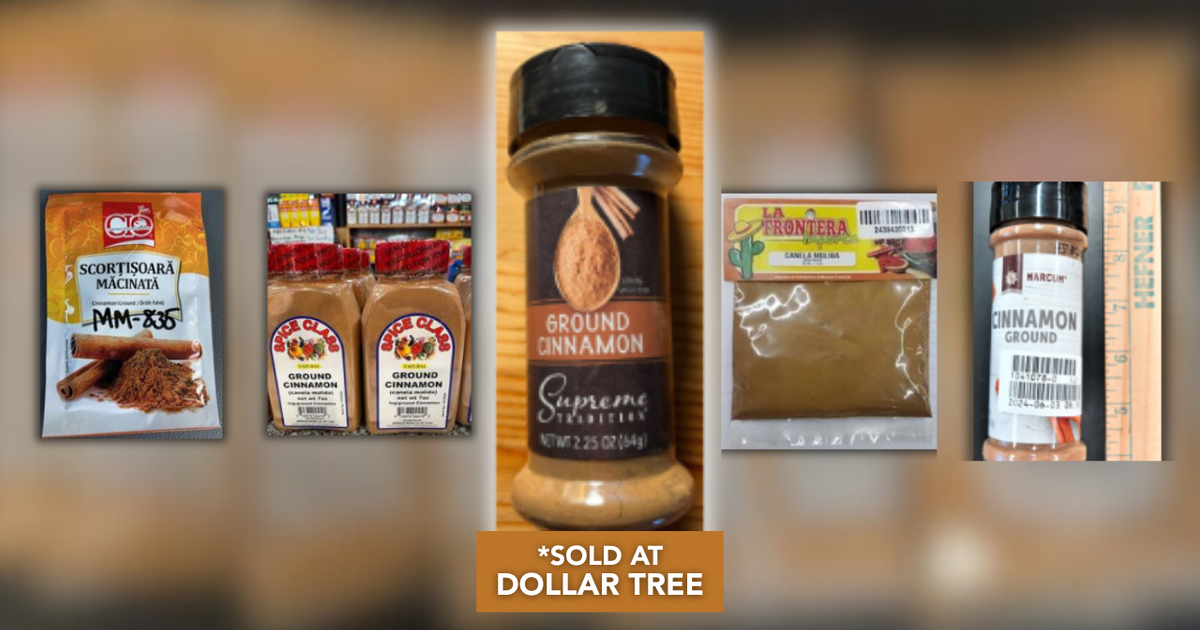
The recall now includes 16 brands of ground cinnamon with elevated lead levels, and the list keeps growing as federal investigators uncover more contaminated products across the country.
Four additional brands were added in October 2025: HAETAE, Roshni, Durra, and Wise Wife, bringing the total number of recalled products to a concerning new high. The Food and Drug Administration isn't mincing words about the danger: consumers should immediately throw away any of these products and avoid purchasing them until further notice.
The expanding contamination crisis
What started as a targeted investigation has grown into a nationwide food safety alert spanning multiple states and store chains. Lead levels range from 2.03 to 7.68 parts per million (ppm), levels that may seem small but represent a serious health risk with prolonged exposure.
The recalled products aren't limited to specialty import stores—some are sold at familiar retailers like Dollar Tree, making this a concern that touches everyday shopping routines. From the SWAD brand sold at Patel Brothers to Supreme Tradition found at Dollar Tree locations, the contamination has spread across diverse retail networks.
Ten of the 16 brands have issued recall announcements, but the cooperation hasn't been universal. The FDA has been unable to reach the HAETAE manufacturer, Haitai Inc. USA, to request a voluntary recall, highlighting the challenges federal regulators face in protecting consumers.
Here’s the full list of brands the FDA says you should avoid, along with the measured lead content (in parts per million, or ppm):
- Roshni (2.27 ppm)
- HAETAE (4.60 ppm)
- Durra (2.44 ppm)
- Wise Wife (2.49 ppm)
- Jiva Organics (2.29 ppm)
- Super Brand (7.68 and 6.60 ppm)
- Asli (2.32 ppm)
- El Chilar (3.75 and 7.01 ppm)
- Marcum (2.22 and 2.14 ppm)
- SWAD (2.89 ppm)
- Supreme Tradition (2.37 ppm)
- Compania Indillor Orientale (2.23 ppm)
- ALB Flavor (3.93 ppm)
- Shahzada (2.03 ppm)
- Spice Class (2.04 ppm)
- La Frontera (2.66 ppm)
How it got to this point
This expanding recall didn't happen in a vacuum—it's the direct result of lessons learned from a devastating food safety crisis in 2023. Over 560 children were sickened by lead-tainted applesauce pouches that contained cinnamon with astronomical lead levels.
The 2023 WanaBana Crisis
The WanaBana products had lead levels of 2,270 to 5,110 ppm—more than 1,000 times higher than the current recalled products.
This massive contamination led to hundreds of children requiring medical treatment.
It sparked the FDA's intensive cinnamon monitoring program that's now uncovering these additional problems.
Following that crisis, the FDA launched a comprehensive testing program, working with state health departments to sample cinnamon products at retail stores nationwide. What they're finding suggests the problem extends far beyond that initial contamination—it's a systemic issue affecting multiple suppliers and distribution channels.
Why this matters especially for seniors
While the FDA's focus has been on protecting children from lead exposure, older adults face their own unique risks from lead contamination. The health effects can be particularly concerning for people over 60, who may already be managing multiple health conditions or taking medications that could interact with lead exposure.
Lead accumulates in the body over time, and adults who've lived through decades of environmental lead exposure may already have elevated levels. Adding more lead through contaminated food products compounds these risks, potentially affecting cardiovascular health, kidney function, and cognitive performance.
Products have long shelf lives, meaning contaminated cinnamon could have been sitting in kitchen cabinets for months or even years before the recall announcements. For seniors who may stock up on frequently used spices or have jars that date back several seasons, this makes the cabinet check even more crucial.
Also read: Health warning: Never combine these 3 common spices with your prescriptions
The contamination isn't accidental
Understanding how lead gets into cinnamon reveals the disturbing reality behind these recalls. While some contamination occurs naturally through soil absorption or processing equipment, lead can be added intentionally to increase weight and profitability.
This deliberate adulteration represents a particularly troubling aspect of the crisis. Some producers and distributors have been caught adding lead compounds to spices as a way to increase their weight and boost profits—putting consumers at risk for purely financial gain.
The contamination can also occur through:
- Lead-contaminated soil where cinnamon trees grow
- Processing equipment that contains lead components
- Storage containers or packaging materials
- Cross-contamination during transportation
What to do if you have these products
Don't take any chances with potentially contaminated cinnamon. The FDA's recommendation is clear and immediate: throw away any of the recalled products, even if you've been using them without apparent problems.
Here's your action plan:
Check your spice cabinet immediately: Look for these brand names: HAETAE, Roshni, Durra, Wise Wife, Jiva Organics, Super Brand, Asli, El Chilar, Marcum, SWAD, Supreme Tradition, Compania Indillor Orientale, ALB Flavor, Shahzada, Spice Class, and La Frontera.
Don't just look at recent purchases: Some of these products may have been in your cabinet for months or years before the recall was announced.
Dispose of them safely: Wrap the containers in newspaper or place them in a sealed bag before putting them in your household trash. Don't dump the cinnamon down the drain or in your garden.
Clean your spice cabinet: Wipe down the area where the recalled products were stored to remove any residual contamination.
Contact your doctor: If you've been using these products regularly, especially if you have health concerns or take medications, discuss potential lead exposure with your healthcare provider.
Also read: Amazon shoppers alert: Popular multivitamins recalled over risk of serious injury or death
Finding safer alternatives
The recall doesn't mean you need to give up cinnamon entirely—it means being more selective about where and what you buy. When shopping for replacement cinnamon, consider these strategies:
Choose products from major national brands that have established quality control systems and regular testing protocols. While no brand is immune to contamination issues, larger companies typically have more resources dedicated to food safety testing.
Consider organic options from reputable producers, as organic certification requires more stringent oversight of growing conditions and processing methods.
Buy from retailers with good track records for food safety recalls and customer notifications. Stores that quickly remove recalled products and notify customers demonstrate better safety protocols.
The bigger picture: systemic food safety challenges
This cinnamon crisis highlights broader concerns about imported food safety and the challenges of monitoring a global food supply. The FDA estimates that it inspects only a small fraction of imported food products, relying heavily on cooperation from manufacturers and distributors.
The agency's “Closer to Zero” initiative aims to reduce heavy metal contamination in foods, but the program faces significant resource constraints. Recent budget pressures have made comprehensive monitoring even more challenging, though the FDA continues to prioritize high-risk products like spices.
State health departments have become crucial partners in this effort, with laboratories in Arkansas, California, Connecticut, Maryland, Missouri, New York, and Virginia all contributing testing data that led to these recalls. This cooperative approach has proven essential for identifying contaminated products that might otherwise slip through federal oversight.
Looking ahead: staying informed and safe
The expanding nature of this recall—from 12 brands to 16 in just a few months—suggests that more contaminated products may surface as testing continues. The FDA has committed to updating its public health alerts as new information becomes available, making it important to stay connected to reliable food safety information.
Sign up for FDA recall notifications if you haven't already, and consider following your state health department's food safety alerts. These early warning systems can help you identify problems before they affect your household.
Remember that food safety is an ongoing concern, not a one-time fix. Regular cabinet cleanouts, checking expiration dates, and staying informed about recalls all contribute to keeping your kitchen safe.
Read next:
- Highest risk warning issued as mushroom recall expands nationwide
- FDA issues urgent warning as fruit cocktail recalled in 27 states
- Check your pantry: This popular rice brand is being recalled over a surprising safety issue
Have you checked your spice cabinet yet, and did you find any of the recalled brands? Share your experience in the comments below—your story might help other readers take action to protect their families.






